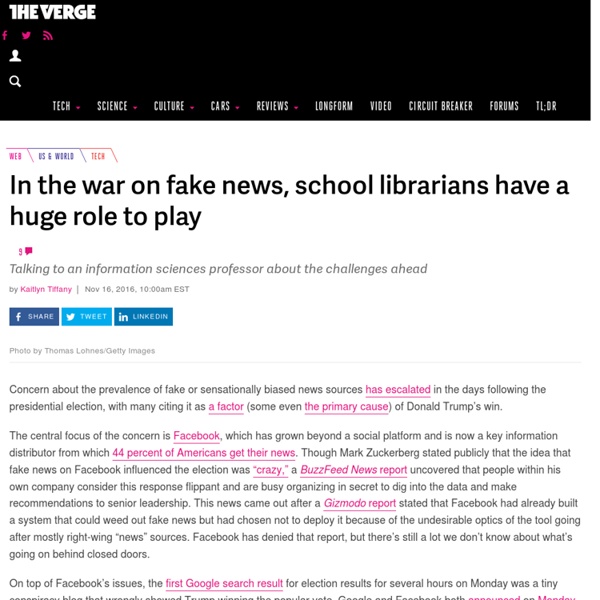



Post-Truth and Fake News Earlier in the year I was tasked with creating a resource guide on “post-truth” and fake news. It’s not something I was clamoring to do. To be honest: I was still in the post-election malaise–and my heart was just not into it. Rarely would I label any of my work tasks as “edicts,” (I like the flexibility and creativity of my job) but this time it was. As part of a broader campus-wide discussion, the library needed to play a part. I began by facilitating a meeting with the librarians on the topic of:
Getting Out of the Filter Bubble: Finding The Real You Online I recently had a great (and timely) conversation with one of the counselors from International School Manila at the EARCOS Teacher’s Conference in Kota Kinnabalu, Malaysia (check out all the resources from all of my sessions here). She said: “I wish there was a way to help students recognize what their online profile looks like to other people. They often think what they’re posting is great, but it can be hard for them to view it through someone else’s eyes.” Lesson Plan: How to Spot Fake News The problem of fake news came to a dizzying head in 2016 when a man fired a shot in a family pizzeria as he “self-investigated” a false report of a child abuse ring led by top democrats. A BuzzFeed report confirmed that fake news stories, such as the one that claimed Hillary Clinton sold arms to ISIS, were actually viewed more times than articles from established and legitimate news sources. Did fake news have an impact on the election? How do we address the problem from here? This lesson plan features a Channel One News report on the problem. Then, students analyze the problem and consider steps media outlets and individuals need to take to prevent the viral spread of propaganda.
Digital content curation: For students! – Kay Oddone – Medium Originally published on LinkingLearning I’ve been a fan of digital content curation for a long time. I’ve blogged about it on many occasions; first waxing lyrical about Diigo way back in 2011, then celebrating the new year in 2013 by suggesting resolutions to use curation to manage content overload and then reflecting on curation as an art form more recently. Good Tools for Teaching Students How to Evaluate Web Content Credibility Source: Butler University Library, adapted from Meriam Library at CSU, Chico One of my favorite lessons to teach is about evaluating the credibility of web sites and other digital content. I often start by showing the classic “Can't Lie On The Internet” video from AllState, which gets a laugh and helps to get students in the right mind set.
The Future of Free Speech, Trolls, Anonymity and Fake News Online Many experts fear uncivil and manipulative behaviors on the internet will persist – and may get worse. This will lead to a splintering of social media into AI-patrolled and regulated ‘safe spaces’ separated from free-for-all zones. Some worry this will hurt the open exchange of ideas and compromise privacy
Critical thinking is a key skill in media and information literacy, and the mission of libraries is to educate and advocate its importance. Discussions about fake news has led to a new focus on media literacy more broadly, and the role of libraries and other education institutions in providing this. When Oxford Dictionaries announced post-truth was Word of the Year 2016, we as librarians realise action is needed to educate and advocate for critical thinking – a crucial skill when navigating the information society. Question Everything – Kay Oddone – Medium Our existence is dominated by questions. From the youngest baby, who wonders whether their chubby little toes will fit into their mouths, to the leading Nobel Prize physicist who ponders the stuff of the universe, questions fill our waking moments. Asking questions underpins how we learn. Have you ever spent time with a 3 year old? Their intense curiosity about everything reflects their burning need to know, which in turn, feeds their development.
ELLLO Views #41 News Source primarily In Canada I got my news from primarily watching television. The word 'primarily' has the same meaning as 'mainly'.